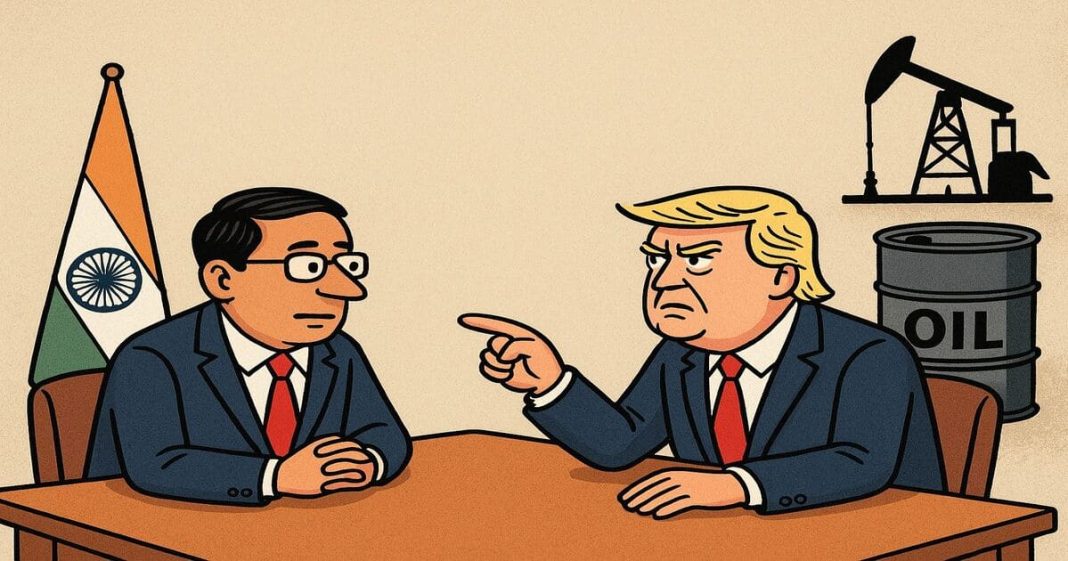India has put out a formal request to the US administration to allow it to buy oil from Iran and Venezuela to compensate for the reduced oil purchase from Russia. The reports indicated that Indian refiners would need the U.S. to allow imports of crude from sanctioned nations like Iran and Venezuela if they were to significantly reduce Russian oil purchases.
The visiting delegation conveyed their message during talks with Trump officials, the report said. The Indian officials highlighted how simultaneously limiting their refiners’ access to Russian-Iranian-Venezuelan oil could lead to a global price increase. An Indian delegation is visiting India this week on the exponential trade tariff imposed by the Trump administration on India on the pretext of buying Russian oil.
Trade Deal Hinges on Reduction of Russian Oil Imports
A representative at the U.S. Embassy in New Delhi told Bloomberg that India’s import of Russian crude oil is impacting the U.S. interest in controlling the harmful activities of Russia. Meanwhile, Indian Commerce Minister Piyush Goyal has expressed India’s interest in buying crude oil from the USA.
The minister said that India’s economic and security goals will have a high involvement of the US in the future. India meets 90% of its oil energy needs through the import of oil, and importing from Russia has significantly reduced its import bill.
India had stopped buying oil from Iran in 2019. Moreover, the country’s biggest importer, Reliance, also stopped buying oil from Venezuela early this year. India may choose to buy oil from the Middle East. However, it will increase its import bill significantly. On average, Indian refiners paid $68.90 for a Russian barrel in July, as compared to $77.50 from Saudi Arabia and $74.50 from US, US shows the statistical data.
India said on Friday its officials held “constructive” talks with U.S. counterparts during a visit to Washington this week, and both sides agreed to continue discussions aimed at concluding a mutually beneficial trade deal soon.
A delegation led by Commerce and Industry Minister Piyush Goyal visited the U.S. from September 22 to 24 and met U.S. Trade Representative Jamieson Greer and Ambassador-designate Sergio Gor.
Goyal and Greer also joined a meeting between India’s Foreign Minister Subrahmanyam Jaishankar and U.S. Secretary of State Marco Rubio on the sidelines of the U.N. General Assembly in New York, India’s foreign ministry spokesperson said.
“The focus of the discussion was on trade and tariffs. Other aspects of our bilateral relationship were also reviewed,” foreign ministry spokesperson Randhir Jaiswal told a regular briefing.
Read more: UNGA 2025: Bangladesh’s Yunus slams India on Hasina, warms up to Pakistan
A senior government official, speaking on condition of anonymity, said New Delhi is pushing for the removal of the 25% additional tariff imposed by Washington on goods from India for its buying of Russian oil, with both sides aiming to conclude the first part of the deal by autumn.
H-1B Fees and Tariff Hikes Add Pressure on Indian Economy
On August 27, President Donald Trump announced a 25% punitive levy on Indian imports, doubling overall tariffs on goods imports from the country to 50%, as part of Washington’s pressure campaign on Moscow over its invasion of Ukraine.
U.S. trade negotiators have reportedly told Indian officials that the India-U.S. trade deal is dependent on India curbing its Russian crude oil imports. The lowering of Indian tariff rates and finalizing a trade agreement hinges upon India curbing its Russian crude oil imports. Meanwhile, India-USA has been directly targeting India through its two ranges of policies, which include the hike in the H-1B visa fee, with statistics claiming that 70% of the beneficiaries of these visas are from the Indian community.
This is another blow to the service sector of India. A U.S. official told the news agency that while trade talks are undergoing with India, further discussions are imperative to solve American concerns about market excess, trade imbalances, and India’s ongoing procurement of Russian crude oil. International media reports that despite the positive dialogue on the trade talks, no major progress has been achieved so far.
U.S. President Trump’s latest move to impose a 100% tariff on the patented branded drugs is expected to have a limited impact on India’s pharma industry as well, as most Indian drug makers sell generic pharmaceutical drugs to the U.S. However, Indian pharmaceutical companies are worried about the prospect of further escalation amid U.S.-India trade tensions. With consecutive policy changes and tariffs imposed by the Trump administration, India needs to settle trade talks with the US soon, before it becomes an uncontrollable economic crisis.














